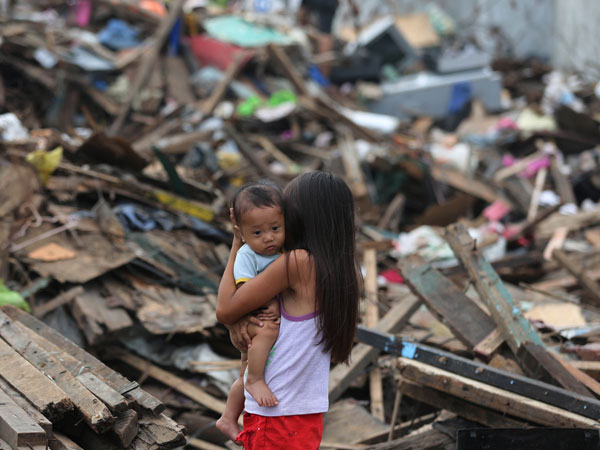
A girl survivor holds her brother as they walk along debris from damaged homes at typhoon-ravaged Tacloban City on Dec. 7, 2013. The Department of Social Welfare and Development and the United Nations World Food Program will soon start distributing cash to beneficiaries of a government handout program who have been affected by Supertyphoon “Yolanda.” AP PHOTO/AARON FAVILA
The Department of Social Welfare and Development (DSWD) and the United Nations World Food Program (WFP) will soon start distributing cash to beneficiaries of a government handout program who have been affected by Supertyphoon “Yolanda.”
Social Welfare Secretary Dinky Soliman and Praveen Agrawal, representative and country director of the WFP to the Philippines, signed Thursday a memorandum of understanding to provide P260 million ($6 million) in cash assistance to 500,000 typhoon victims who are covered by the conditional cash transfer program in 50 devastated towns in Leyte and Samar provinces.
Soliman said the partnership with the WFP proved that during times of adversity, the cash handout program becomes a good avenue for humanitarian aid to reach its intended recipients.
Under the agreement, a fixed emergency cash grant of P1,300 per family per month will be added to the monthly cash subsidy given to the beneficiaries for December this year and January next year.
“The local economy plays an important role in this recovery and in order to put it back on track, the people need money that they can use to purchase goods—goods that they need in order to survive,” Soliman said.
Most poor
The “most food insecure” families were identified in the WFP’s post-Yolanda assessment as the vulnerable families already covered by the cash transfer program.
In addition to the cash grant from the WFP, each family will also receive a one-month supply of rice.
The agreement for cash support through the handout program is a new step in the strategic evolution of the assistance provided by the WFP, Soliman said.
The WFP has already distributed nearly 6,000 metric tons of rice, 190 MT of high-energy biscuits and 2 MT of nutritional products for children, which have been distributed to some three million people, in partnership with the DSWD and other aid organizations.
“The WFP’s response is centered on three principles: versatility, scale and partnerships. We need to provide the right kind of assistance as circumstances change and at [present], our assessments indicate that a combination of cash support and… rice is an effective approach,” Agrawal said.
The cash transfer program, also known as Pantawid Pamilyang Pilipino, is a human development program of the government that invests in the health and education of poor families, primarily of children aged 14 and below.
Helping the helpers
Meanwhile, the DSWD and the Department of Education thanked government workers, teachers and volunteers for participating in “pampering activities” in Tacloban City on Monday, a month after Yolanda wrought havoc in the Visayas, heavily devastating Leyte and Samar.
Dubbed the “Feel Good” project, the event had the participants treated to free haircuts and makeovers from trained make-up artists.